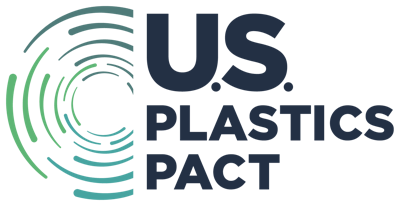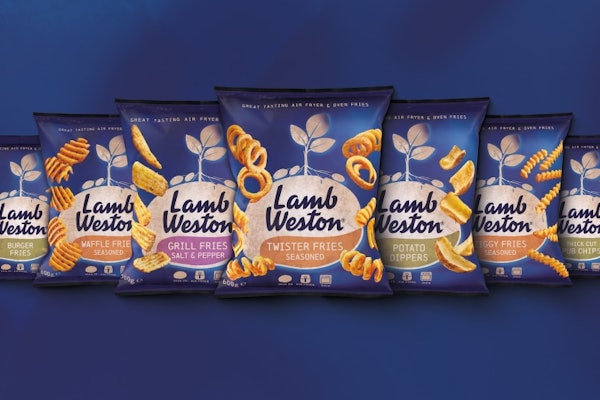Today, the U.S. Plastics Pact, a collaborative led by The Recycling Partnership and World Wildlife Fund (WWF), was launched as part of the Ellen MacArthur Foundation’s global Plastics Pact network. According to its organizers, the U.S. Plastics Pact is an ambitious initiative to unify diverse public-private stakeholders across the plastics value chain to rethink the way we design, use, and reuse plastics, to create a path toward a circular economy for plastic in the U.S.
Says the initiative, U.S. industry leaders recognize that significant, system-wide change is needed to realize a circular economy for plastic; individualized action isn’t enough. The U.S. Plastics Pact brings together companies, government entities, non-governmental organizations (NGOs), researchers, and other stakeholders in a pre-competitive platform for industry-led innovation. The U.S. Plastics Pact has been formed to drive collaborative action and deliver a significant system change toward a circular economy for plastic, enabling companies and governments in the U.S. to collectively meet impactful goals by 2025 that they could not otherwise meet on their own.
“Together, through the U.S. Plastics Pact, we will ignite systems change to accelerate progress toward a circular economy,” says Sarah Dearman, VP of Circular Ventures for The Recycling Partnership. “As the lead organization that engages the full supply chain to advance circularity in the U.S., it’s a natural fit for The Recycling Partnership to further collaborative action with other industry leaders to create substantial, long-lasting change for the betterment of our planet. The results from the U.S. Plastics Pact’s efforts to advance packaging, improve recycling, and reduce plastic waste will benefit the entire system and all materials.”
In line with the Ellen McArthur Foundation’s vision of a circular economy for plastic, which unites more than 850-plus organizations, underpinned by common definitions and concrete targets, the U.S. Plastics Pact brings together plastic packaging producers, brands, retailers, recyclers, waste management companies, policymakers, and other stakeholders to work collectively toward scalable solutions tailored to the unique needs and challenges within the U.S landscape, through knowledge sharing and coordinated action.
As of today, more than 60 Activators have joined the U.S. Plastics Pact, representing each part of the supply and plastics manufacturing chain. By joining the U.S. Plastics Pact, Activators agree to collectively deliver these four targets:
- Define a list of packaging to be designated as problematic or unnecessary by 2021 and take measures to eliminate them by 2025.
- By 2025, all plastic packaging is 100% reusable, recyclable, or compostable.
- By 2025, undertake ambitious actions to effectively recycle or compost 50% of plastic packaging.
- By 2025, the average recycled content or responsibly sourced bio-based content in plastic packaging will be 30%.
Results of measurable change in each of the target areas and transparent reporting are key outcomes of the U.S. Plastics Pact. Progress of the U.S. Pact will be tracked through WWF’s ReSource: Plastic Footprint Tracker, which provides a standard methodology to track companies’ plastic footprints and publicly report on their plastic waste commitments each year. The report will be made publicly available each year.
“Plastic pollution is a global crisis that needs local solutions, and the United States is one of biggest opportunities where regional interventions can result in transformative change around the world,” says Erin Simon, Head, Plastic Waste and Business at World Wildlife Fund. “To do this, WWF sees the U.S. Plastics Pact as the linchpin for uniting the critical stakeholders—industry leaders, waste management systems, and policymakers—under a common vision and action plan for meaningful, measurable impact.”
Read related articles from Packaging World:
Packaging Policy Update & 2020 Outlook
Controversial Plastics Legislation Proposed
Fighting Back Against Anti-Plastics Legislation
Roadmap Aims to Address Systemic Issues in the U.S. Recycling System
Planning for Recovery Systems Change
Achieving this vision will require new levels of innovation and collaboration from all Activators of the U.S. Plastics Pact and beyond, say organizers of the initiative. The U.S. Pact is launched as part of the Ellen MacArthur Foundation’s global Plastics Pact network, joining Plastics Pacts in Europe, Latin America, and Africa as a globally-aligned response to plastic waste and pollution.
“This is an exciting step on the journey towards a circular economy for plastic in the United States, one that keeps plastic in the economy and out of the environment,” says Sander Defruyt, Lead of the Ellen MacArthur Foundation’s New Plastics Economy initiative. “This effort will not only help to create solutions in the U.S., but across the world, as part of our global network of Plastics Pacts. We are looking forward to working with all those involved to drive real change, by eliminating problematic and unnecessary plastic items, innovating to ensure all plastic packaging is reusable, recyclable, or compostable, and circulating it in practice. We encourage others to join us on this journey towards a United States free of plastic waste and pollution.”
To maintain continual and effective collaboration, the U.S. Plastics Pact will seek guidance from an Advisory Council, made up of 10 Activator organizations, companies, and governments. They include:
· Amcor
· Balcones Resources Inc.
· Austin Resource Recovery (City of Austin, TX)
· Eureka Recycling
· Grove Collaborative
· Mars, Incorporated
· Target
· The Coca-Cola Company
· Unilever United States
· Walmart, Inc.
The next step for the U.S. Plastics Pact will be to create a roadmap, laying out the steps to achieving the targets outlined above. For more information on how to join the U.S. Plastics Pact and drive collective action, visit the website or contact [email protected].

























